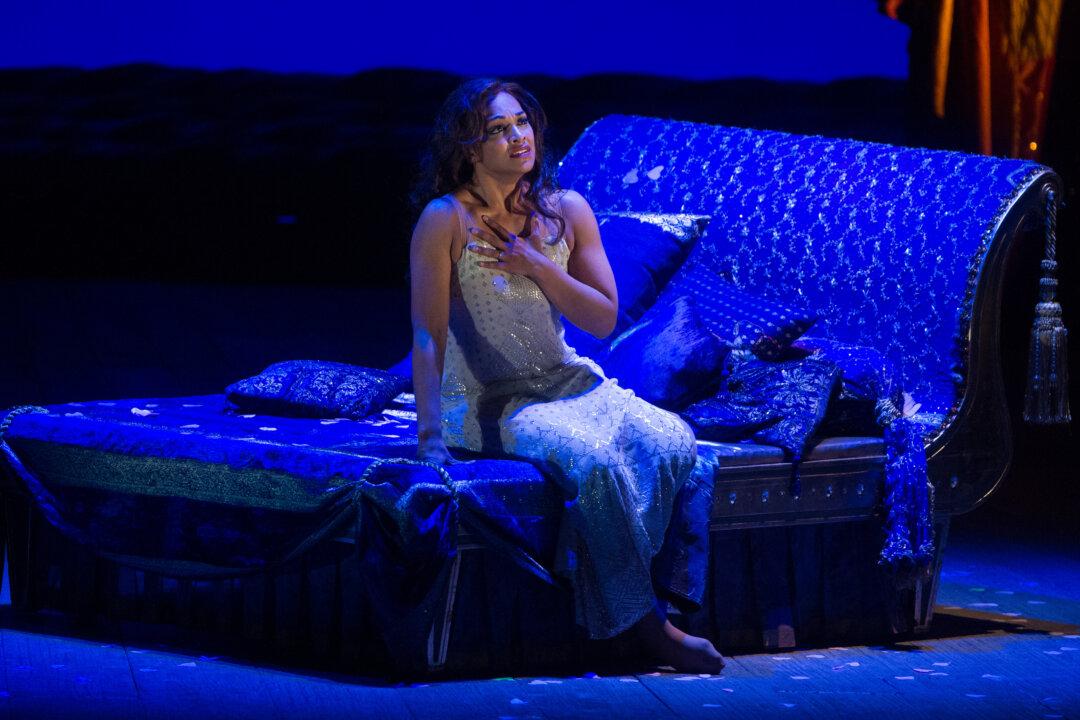NEW YORK—When the Metropolitan Opera’s general manager Peter Gelb came out on stage before the April 9th performance of “Giulio Cesare,” there was a collective groan from the audience. He started by saying he had some bad news but a positive note as well. Soprano Natalie Dessay, who had appeared at the first performance as the female lead, Cleopatra, to rave reviews, had to cancel because of illness.
On the plus side, Danielle de Niese was in town with her husband and was supposed to sit in Gelb’s box that evening. Instead, he asked her to step into the role that she had performed in the same production, directed by David McVicar, when it played at Glyndebourne in 2005. The audience broke into applause upon hearing de Niese’s name.
De Niese was also Cleopatra at the Lyric Opera of Chicago in 2007.
The soprano went on to score a personal triumph in the delightful new production of the Handel opera.
The opera starts with the Egyptian people welcoming Julius Caesar to Alexandria, where he is pursuing his enemy Pompey. The king of the Egyptians (Ptolemy) sends Caesar a gift—the head of Pompey. Sextus (Pompey’s son) promises his mother Cornelia that he will bring justice to his father’s murderer. Ptolemy’s sister Cleopatra wants to wrest power from her brother and she decides to win Caesar’s affection. Meanwhile, Ptolemy learns that Caesar is not happy with the “gift” and plots his murder.
Cleopatra presents herself to Caesar under the assumed identity of a servant named Lydia, who has been wronged by Ptolemy. She convinces him to help her and also offers to help Cornelia and Sextus in their plot against Ptolemy. However, the Egyptian king achieves the upper hand by sending Sextus to prison and Cornelia to his harem. (Both Ptolemy and his general Achilla have designs on Pompey’s widow.)
Ptolemy’s army defeats Caesar’s and, believing the Roman to be dead, the Egyptian king puts his sister in chains. Caesar turns up and frees her, while Sextus kills Ptolemy. Caesar makes amends with Cornelia and Sextus and places Cleopatra, whom he loves, on the throne.
The four and a half hour opera seria contains a variety of emotions, from romantic and playful to mournful and angry. McVicar’s imaginative production moves the action from 48 B.C. to a later period with visual suggestions that the ancient Romans are the English army invading India. The sets and costumes are as entrancing as the music.
De Niese is remarkable. Not only does the soprano deliver one complex aria after another with finesse and vocal beauty, but she also manages the intricate dance moves created by Andrew George (with inspiration from Bollywood movies) with precision and charm. It would be a tour-de-force performance even if she had spent weeks rehearsing, but to step in at a moment’s notice is truly amazing.
De Niese looks terrific in Brigitte Reiffenstuel’s costumes, especially when she is dressed as a jazz age flapper.
The rest of the cast is also first-rate: David Daniels (probably the world’s leading countertenor) is Caesar. Patricia Bardon is Cornelia, and Alice Coote is her son Sesto. Christophe Dumaux is Ptolemy, and Guido Loconsolo is his general Achilla.
Harry Bicket again demonstrated that he is one of the leading conductors of Baroque music.
Whether Cleopatra will be portrayed by Natalie Dessay or Danielle de Niese, this is a production that opera lovers should not miss.
“Giulio Cesare” is running intermittently through May 10th (metoperafamily.org). The final Live in HD transmission of the 2012-13 season will be “Giulio Cesare” on Saturday, April 27th at 12 noon ET. Whether Cleopatra will be portrayed by Natalie Dessay or Danielle de Niese, this is a production that opera lovers should not miss.
Barry Bassis reviews NYC shows, concerts, and exhibits as wells as new CDs and DVDs.






